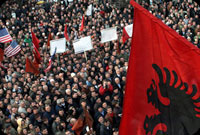
KOSOVAR INDEPENDENCE RECOGNIZED, RUSSIA’S BLUFF CALLED IN ABKHAZIA AND SOUTH OSSETIA
Publication: Eurasia Daily Monitor Volume: 5 Issue: 31
By:

On February 17 Kosova declared officially its independence from Serbia. On February 18 the United States and several major European countries recognized Kosova as an independent state. More than 20 (out of 27) European Union member countries are prepared to extend recognition.
Russia anticipated this outcome some weeks, if not months, ahead of its occurrence. By the end of 2007 Moscow had started backtracking on its retaliatory threats to recognize the “independence” of post-Soviet secessionist territories. It had to backtrack, lest its warnings be exposed as the bluff they were.
Moscow’s threat to use Kosova’s secession as a “precedent” or “model” for resolving post-Soviet conflicts was never a credible threat, unless the Kremlin was bent on incurring severe damage and no gain to its policies on a wide range of interests: Relations with the West, with members of the Commonwealth of Independent States (far beyond those immediately affected by secessions) and with international organizations, as well as Russia’s own security situation in the North Caucasus would have been jeopardized.
Those concerned about Russian exploitation of a Kosova “precedent” overlooked the fact that Moscow remains more than content to exploit the existing, “frozen” situation in the unresolved conflicts. This it can continue doing effectively and at low cost to itself, as long as the West does not prioritize the resolution of the post-Soviet conflicts.
Indications are now multiplying that Moscow has blinked on its most specific threat: that to “recognize the independence” of Abkhazia and South Ossetia. Russia had singled out these two Georgian territories as prime candidates for “recognition.” This line of attack contradicted Moscow’s own claim that resolution of all secessionist conflicts in Europe and the world must follow a common “model” or “single standard.” Such selectivity about Abkhazia and South Ossetia reflected Moscow’s special enmity toward Georgia, the immediate territorial proximity (whereas Karabakh and Transnistria are not contiguous to Russia), and the Russian policy of allowing Armenia de facto a free hand in Karabakh, while Moscow claims de facto a free hand in the two Georgian territories.
Largely for those reasons, Moscow handed out Russian citizenship en masse in Abkhazia and South Ossetia, so as to claim a right of intrusive protection there, including military presence. At the same time it left the issues of citizenship and security protection in Karabakh up to Armenia. And it has been negotiating with Moldova since 2006 regarding a settlement that would leave Transnistria within Moldova, in return for a certain measure of Russian political and military oversight over a Moldovan state “reunified” in that way.
These highly differentiated, expediency-based approaches nullified from the outset Russia’s argument about a “Kosovo precedent” with general applicability. Had it applied such a “precedent” unilaterally in Abkhazia and South Ossetia, the Kremlin would have been exposed as singularizing Georgia and targeting it for a wanton act of aggression. With Russian troops and Russian-appointed local leaders already deployed in those two enclaves, any Russian “recognition” would have been seen worldwide as open military occupation and annexation. Moscow did not need to risk such a scenario, since the existing situation suits Russian purposes well.
As Kosova’s declaration of independence and Western recognition drew near, Moscow must have concluded that its threats against Georgia were unusable threats. Consequently, Moscow seems to be seeking a face-saving exit from a political impasse into which it has driven itself. Suddenly the Kremlin is downplaying its all-to-recent, dire warnings.
In his annual news conference (the final one of his presidency) on February 14, President Vladimir Putin denounced Western intentions to recognize Kosova as “unlawful,” and the argument about Kosova’s uniqueness as (Western) “lies.” But Putin went on to declare that Russia would not let itself be provoked into similar “unlawful” actions: “What will we do if they start recognizing Kosovo’s independence unilaterally? We are not going to play the fool. If someone takes a bad decision it does not mean that we should act in the same way. I repeat, we will not play the fool by doing the same thing, acting as if this [Russian recognition of post-Soviet secessions] is a necessary consequence” (Interfax, February 14).
On February 15, Minister of Foreign Affairs Sergei Lavrov received the Abkhaz and South Ossetian de facto leaders, Sergei Bagapsh and Eduard Kokoiti, in Moscow. The Russian communiqués referred to them as “presidents,” by the usage adopted several years ago. Lavrov, as well as accompanying statements by the Russian MFA, merely said that Russia, in light of Kosova, would “reconsider” (peresmotrit) its policy regarding Abkhazia and South Ossetia. Further on the vague tone, Russia would “undoubtedly take [Kosova] into account in Russia’s relations with Abkhazia and South Ossetia” (Interfax, February 15, 16). Thus Putin’s, Lavrov’s, and other Russian MFA statements were worded so as to stop short of repeating previous warnings about recognizing those two secessions.
On February 18, Russia’s Duma and Federation Council released a joint statement condemning the Western recognition of Kosova, but stopping short of warnings about “recognition” of Abkhazia and South Ossetia. The Russian parliament had in recent years adopted a series of resolutions that contained such warnings. Sukhumi and Tskhinvali hoped for more of the same, more than ever now; but they were disappointed. Moreover, the joint statement was adopted quietly by the two chambers’ Councils (leaderships), not the plenums, and without any of the customary fanfare.
At the moment, Moscow wants the Kosova issue returned to the UN Security Council, ostensibly in order to reverse Kosova’s independence and halt its recognition (Interfax, February 15, 16). Such resort to the UNSC also signifies the beginning of a face-saving retreat from the previous show of intransigence. Referring this issue to the UNSC at this point is tantamount to burying it in that veto-bound forum, without openly acknowledging defeat. With this move, Moscow plays to Greater Serbian nationalism, but has no hope to change the situation on the ground.
The CIS summit, scheduled for Thursday, February 21, in Moscow, should further restrain Russian rhetoric about Abkhazia and South Ossetia. No CIS country ever associated itself with Russian threats to recognize the secession of those two Georgian territories. Should Putin revert to such threats, he might at best find himself in the company of Belarus President Alyaksandr Lukashenka (though even this does not seem very likely). Even Armenia would not risk its relations with Georgia by endorsing such Russian threats against Armenia’s neighbor and lifeline to the world. Azerbaijan and Moldova, which face secessionism and military occupations of their territories, would certainly criticize such Russian policy. So would Ukraine and Kazakhstan, both of which reckon with possible Russian exploitation of ethnic issues on their territories.
Moscow’s two-year old bluff has been called in Kosova. While Russian policy remains unpredictable (particularly during the presidential transition in the Kremlin), any Russian leverage through the threat of recognizing the post-Soviet secessions seems to have run out.




